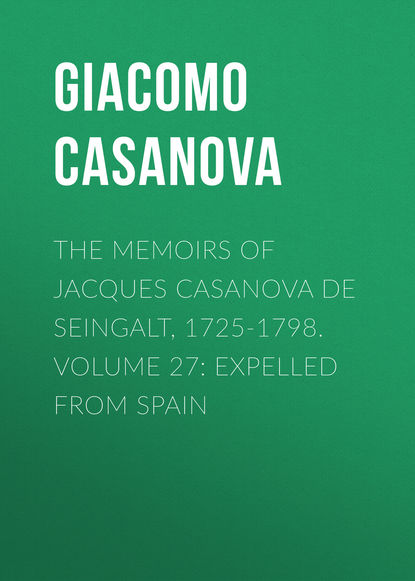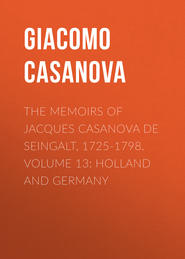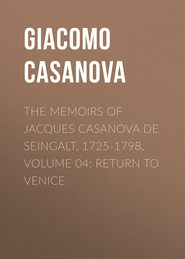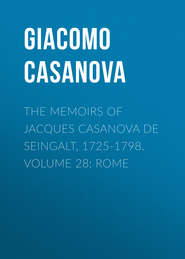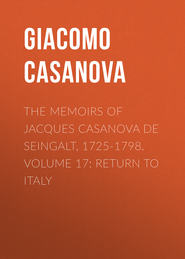По всем вопросам обращайтесь на: info@litportal.ru
(©) 2003-2025.
✖
The Memoirs of Jacques Casanova de Seingalt, 1725-1798. Volume 27: Expelled from Spain
Настройки чтения
Размер шрифта
Высота строк
Поля
"Sir, everything is paid for."
"Paid for! I will not have it!"
"You can settle that with her, but I shall certainly take no payment."
I saw dangers ahead, but as I have never cared to cherish forbodings I dismissed the idea.
I had a letter of introduction from the Marquis de las Moras to Don Miguel de Cevallos, and another from Colonel Royas to Don Diego de la Secada. I took my letters, and the next day Don Diego came to see me, and took me to the Comte de Peralda. The day after Don Miguel introduced me to the Comte de Ricla, Viceroy of Catalonia, and the lover of Nina.
The Comte de Peralada was a young man with a pleasant face but with an ill-proportioned body. He was a great debauchee and lover of bad company, an enemy of religion, morality, and law. He was directly descended from the Comte de Peralada, who served Philip II. so well that this king declared him "count by the grace of God." The original patent of nobility was the first thing I saw in his antechamber, where it was framed and glazed so that all visitors might see it in the quarter of an hour they were kept waiting.
The count received me with an easy and cordiale manner, which seemed to say that he renounced all the dignities of his rank. He thanked Don Diego for introducing me, and talked a good deal about Colonel Royas. He asked me if I had seen the English girl he was keeping at Saragossa, and on my replying in the affirmative, he told me in a whisper that he had slept with her.
He took me to his stables, where he had some splendid horses, and then asked me to dine with him the next day.
The viceroy received me in a very different manner; he stood up so that he might not have to offer me a chair, and though I spoke Italian, with which language I knew him to be well acquainted, he answered me in Spanish, styling me 'ussia' (a contraction of 'vuestra senoria', your lordship, and used by everyone in Spain), while I gave him his proper title of excellence.
He talked a good deal about Madrid, and complained that M. de Mocenigo had gone to Paris by Bayonne instead of Barcelona, as he had promised him.
I tried to excuse my ambassador by saying that by taking the other route he had saved fifty leagues of his journey, but the viceroy replied that 'tenir la palabra' (keeping to one's words) comes before all else.
He asked me if I thought of staying long at Barcelona, and seemed surprised when I told him that, with his leave, I hoped to make a long stay.
"I hope you will enjoy yourself," he said, "but I must warn you that if you indulge in the pleasures which my nephew Peralada will doubtless offer you, you will not enjoy a very good reputation at Barcelona."
As the Comte de Ricla made this observation in public, I thought myself justified in communicating it to Peralada himself. He was delighted, and told me, with evident vanity, that he had gone to Madrid three times, and had been ordered to return to Catalonia on each occasion.
I thought my best plan would be to follow the viceroy's indirect advice, so I refused to join in any of the little parties of pleasure which Peralada proposed.
On the fifth day after my arrival, an officer came to ask me to dinner at the viceroy's. I accepted the invitation with much pleasure, for I had been afraid of the viceroy's having heard of my relations with Nina, and thought it possible that he might have taken a dislike to me. He was very pleasant to me at dinner, often addressing his observations to me, but always in a tone of great gravity.
I had been in Barcelona for a week, and was beginning to wonder why I had not heard from Nina; but one evening she wrote me a note, begging me to come on foot and alone to her house at ten o'clock the same night.
If I had been wise I should not have gone, for I was not in love with the woman, and should have remembered the respect due to the viceroy; but I was devoid of all wisdom and prudence. All the misfortunes I have experienced in my long life never taught me those two most necessary virtues.
At the hour she had named I called on her, wearing my great coat, and with a sword for my only weapon. I found Nina with her sister, a woman of thirty-six or thereabouts, who was married to an Italian dancer, nicknamed Schizza, because he had a flatter nose than any Tartar.
Nina had just been supping with her lover, who had left her at ten o'clock, according to his invariable custom.
She said she was delighted to hear I had been to dinner with him, as she had herself spoken to him in my praise, saying how admirably I had kept her company at Valentia.
"I am glad to hear it, but I do not think you are wise in inviting me to your house at such late hours."
"I only do so to avoid scandal amongst my neighbours."
"In my opinion my coming so late is only likely to increase the probability of scandal, and to make your viceroy jealous."
"He will never hear of your coming."
"I think you are mistaken."
I went away at midnight, after a conversation of the most decent character. Her sister did not leave us for a moment, and Nina gave her no cause to suspect the intimacy of our relations.
I went to see her every evening, without encroaching on the count's preserves. I thought myself secure, but the following warning should have made me desist if I had not been carried away by the forces of destiny and obstinacy in combination.
An officer in the Walloon Guards accosted me one day as I was walking by myself just outside the town. He begged me in the most polite manner to excuse him if he spoke on a matter which was indifferent to him but of great consequence to me.
"Speak, sir," I replied, "I will take whatever you say in good part."
"Very good. You are a stranger, sir, and may not be acquainted with our Spanish manners, consequently you are unaware of the great risk you run in going to see Nina every evening after the count has left her."
"What risk do I run? I have no doubt that the count knows all about it and does not object."
"I have no doubt as to his knowing it, and he may possibly pretend to know nothing before her, as he fears as well as loves her; but if she tells you that he does not object, she either deceives herself or you. He cannot love her without being jealous, and a jealous Spaniard . . .
"Follow my advice, sir, and forgive my freedom."
"I am sincerely obliged to you for your kind interest in me, but I cannot follow your advice, as by doing so I should be wanting in politeness to Nina, who likes to see me and gives me a warm welcome. I shall continue to visit her till she orders me not to do so, or till the count signifies to me his displeasure at my visits to his mistress."
"The count will never do such a thing; he is too careful of his dignity."
The worthy officer then narrated to me all the acts of injustice which Ricla had committed since he had fallen in love with this woman. He had dismissed gentlemen from his service on the mere suspicion that they were in love with her; some had been exiled, and others imprisoned on one frivolous pretext or another. Before he had known Nina he had been a pattern of wisdom, justice, and virtue, and now he had become unjust, cruel, blindly passionate, and in every way a scandal to the high position he occupied.
All this should have influenced me, but it had not the slightest effect. I told him for politeness' sake that I would endeavour to part from her by degrees, but I had no intention of doing so.
When I asked him how he knew that I visited Nina, he laughed and said it was a common topic of conversation all over the town.
The same evening I called on her without mentioning my conversation with the officer. There would have been some excuse for me if I had been in love with her, but as it was . . . I acted like a madman.
On the 14th of November I went to see her at the usual time. I found her with a man who was shewing her miniatures. I looked at him and found that he was the scoundrel Passano, or Pogomas.
My blood boiled; I took Nina's hand and led her into a neighbouring room, and told her to dismiss the rogue at once, or I would go to return no more.
"He's a painter."
"I am well acquainted with his history, and will tell you all about it presently; but send him away, or I shall go."
She called her sister, and told her to order the Genoese to leave the house and never to enter it again.
The thing was 'done in a moment, but the sister told us that as he went out he had said,—
"Se ne pentira." ("He shall be sorry for it.").
I occupied an hour in relating some of the injuries I had received from this scoundrelly fellow.
The next day (November 15th), I went to Nina at the usual time, and after spending two hours in pleasant converse with her and her sister I went out as the clocks were striking midnight.
The door of the house was under an arcade, which extended to the end of the street. It was a dark night; and I had scarcely gone twenty-five paces when two men suddenly rushed at me.





